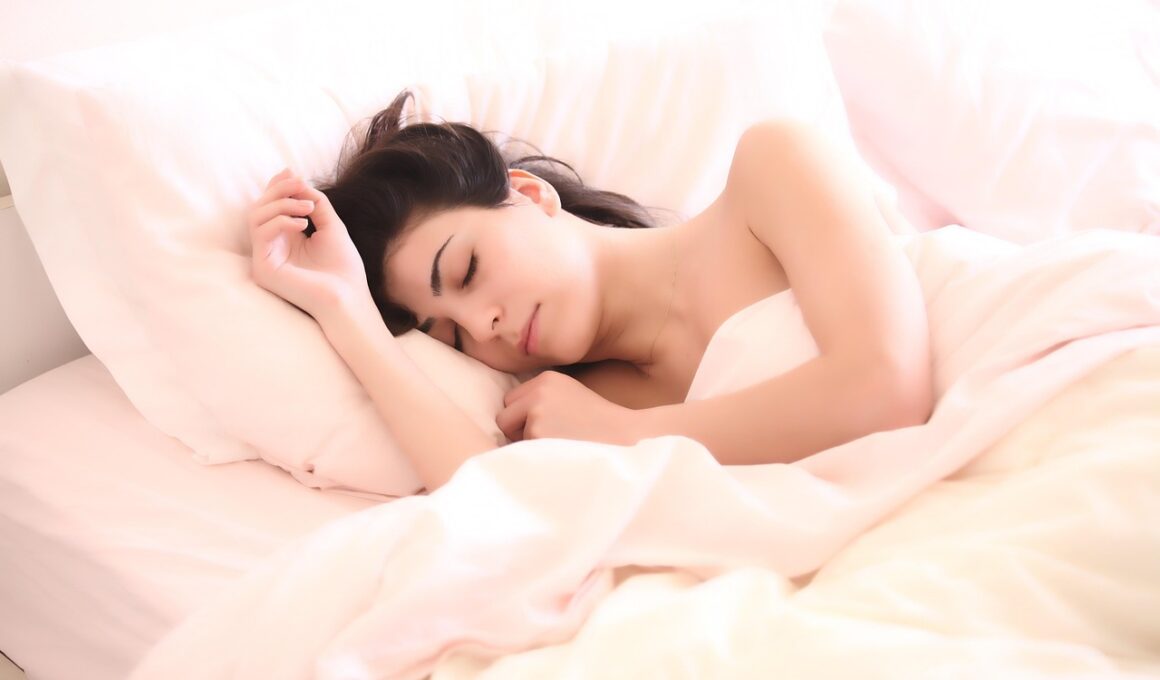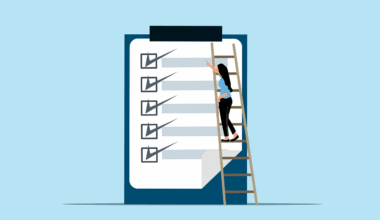How Sleep Tracking Devices Can Enhance Your Recovery
In today’s fast-paced world, sleep tracking devices have gained significant popularity, especially among those interested in improving recovery. These devices use advanced technology to monitor various sleep parameters such as duration, quality, and cycling stages. By providing insightful data, users can make educated adjustments to their nightly routine, ultimately enhancing recovery from daily stressors. Understanding how these devices operate is crucial. Most devices utilize accelerometers and heart rate monitors, capturing movement patterns and physiological changes throughout the night. This combination offers users a comprehensive overview of their sleep cycles. Moreover, some devices integrate with apps, which can help visualize trends and suggest actionable improvements. The cumulative knowledge gathered over time can be invaluable. Overall, improving recovery is essential for performance, mood, and motivation in daily activities. Therefore, investing time to analyze and understand the data provided by sleep tracking devices can lead to profound benefits. Many users report feeling more rested and energized. This improved state can positively influence both physical and mental health, making sleep devices an essential consideration for anyone aiming to optimize their recovery process.
The importance of REM sleep cannot be overstated. During recovery, REM sleep plays a critical role, promoting mental clarity and emotional stability. Sleep tracking devices make it easier to determine how much REM sleep you’re getting. By analyzing your sleep stages, these devices can help identify patterns and inconsistencies, leading to informed decisions about your sleep environment. Users can discover factors negatively impacting their REM sleep, such as poor mattress quality or excessive ambient noise. Making adjustments, like investing in soundproof curtains or a more supportive mattress, may enhance the overall sleep experience. In particular, many sleep devices offer insights into optimal sleep conditions, including temperature and humidity levels. Furthermore, educational content provided by the corresponding apps can help users understand the significance of various sleep stages. This knowledge enables one to rethink their bedtime practices, leading to healthier habits. For example, setting a consistent sleep schedule can foster better recovery outcomes. Overall, enhancing REM sleep through a better understanding of one’s sleep patterns can yield profound recovery benefits.
Understanding Sleep Architecture
Sleep architecture encompasses the structure of your sleep cycle, including periods of deep sleep, light sleep, and REM sleep. Sleep tracking devices are designed to provide insights into these stages, facilitating a more profound understanding of the user’s sleep health. By accurately characterizing sleep architecture, these devices contribute valuable information to enhance recovery. For instance, most devices divide sleep into stages, allowing users to recognize patterns and identify which phases they are lacking. Studies show that deep sleep is particularly crucial for physical recovery. If a user notes insufficient deep sleep, they can take actionable steps to improve that aspect. Users often report that consistent monitoring leads to better sleep habits over time, as they consciously make adjustments based on the collected data. Establishing sleep rituals, improving bedroom conditions, and reducing screen time before bed can enhance sleep architecture. Sleep tracking data can also inform users about the timing of their optimal sleep window, maximizing the benefits of a consolidated rest period. Understanding individual sleep architecture brings broader implications for both physical and mental recovery.
Another notable feature of sleep tracking devices is their ability to integrate seamlessly with other health and fitness technology. Many devices work synergistically with fitness trackers, creating a holistic view of well-being. By correlating physical activity levels with sleep quality, users can achieve a deeper understanding of how their exercise routines affect recovery. When users combine insights from both devices, they often notice trends indicating that exercise can enhance sleep quality, particularly when performed earlier in the day. Conversely, intaking high levels of caffeine or engaging in vigorous workouts close to bedtime can lead to disrupted sleep cycles. Therefore, sleep tracking devices provide essential data that can optimize physical training schedules. Making these adjustments based on tracking data not only improves recovery but also enhances overall physical performance. To facilitate the connection, many sleep and fitness devices offer comprehensive apps that allow tracking of both metrics in one place. Thus, incorporating sleep tracking into a broader physical health strategy empowers users to achieve maximum recovery potential.
The Role of Sleep Hygiene
Sleep hygiene refers to the habits and practices that are conducive to sleeping well on a regular basis. Monitoring sleep patterns with tracking devices can significantly enhance sleep hygiene. Users can observe the effects of behaviors such as caffeine consumption, late-night screen time, or even bedroom cleanliness on their overall sleep quality. Many devices help in encouraging good sleep hygiene by providing reminders or tips based on collected data. For instance, a device may suggest establishing a bedtime routine or dimming lights an hour before sleep. Users often find themselves more motivated to adopt healthier habits when they can see direct correlations between their behavior and sleep quality. Additionally, tracking devices can measure the impacts of lifestyle alterations, helping users streamline their routines for better recovery outcomes. Over time, people who prioritize sleep hygiene tend to report improvements in both sleep quality and their overall sense of wellbeing. Sleep hygiene and quality are closely intertwined; hence, building these habits is vital for enhancing rest and recovery.
For those who frequently travel or have irregular schedules, sleep tracking devices can be especially beneficial. They help maintain sleep quality, regardless of environmental changes. Many devices feature travel-friendly designs or smartwatch capabilities, allowing users to easily transport and use them while away from home. Real-time sleep insights enable individuals to make immediate adjustments to their sleeping arrangements, such as using sleep masks or noise-canceling headphones. By tracking sleep while traveling, individuals can accommodate time zone changes impacting their rest. Many travelers often experience jet lag, but monitoring sleep quality can yield insights to mitigate its effects. By adapting their sleep strategy based on data collected, users can recover more effectively from travel fatigue. Thus, for frequent travelers, these devices can be an essential tool to ensure quality sleep while on the go. Having a consistent sleep practice amidst varying conditions aids in maintaining alertness and mood. Ultimately, stable sleep is integral to physical recovery, enhancing overall personal wellness, and performance.
Conclusion: Embracing Technology for Better Rest
In conclusion, embracing sleep tracking devices offers various benefits for individuals wanting to improve their recovery process. They provide valuable insights that empower users to make informed decisions about their sleep environment and habits. By recognizing patterns in data, individuals can enhance their sleep quality, ultimately leading to better physical and mental well-being. The growth of sleep technology reflects an increasing awareness of the vital role sleep plays in overall health. Proper recovery hinges on quality sleep, and these devices are key to unlocking individual potential. Users often find an improvement in their daily activities, cognitive performance, and overall mood. As technology continues to evolve, better accuracy and new features will enhance user experiences further. Whether one is an athlete, a busy professional, or simply seeking to improve their quality of life, integrating sleep tracking into their routine can lead to transformational outcomes. Consequently, proactive measures in enhancing sleeping patterns will yield dividends across multiple life domains. Consider exploring various available devices tailored to individual needs for optimal recovery and enhanced performance.
Sleep and recovery are essential components of health that everyone should prioritize. By leveraging the insights provided by sleep tracking devices, you can take actionable steps toward better rest and enhanced recovery outcomes. While there are numerous options available, it’s essential to choose one that fits your lifestyle and preferences. This approach will allow you to maximize the advantages of monitoring your sleep, making the recovery process smoother and more effective. Certain devices even offer personalized recommendations based on individual profiles, facilitating deeper insights and targeted changes. This personalized data can be incredibly motivating, as users strive to achieve illustrated goals. High-quality sleep is a pillar of good health, influencing performance and emotional well-being. As technology advances, more users will likely harness the power of data to optimize their sleep habits. As a part of a comprehensive health strategy, integrating sleep monitoring can significantly enhance your overall quality of life. Therefore, it’s vital to explore the various options available and find the ideal device for your unique needs. Implementing consistent monitoring practices empowers users to take charge of their sleep and recovery journey.


